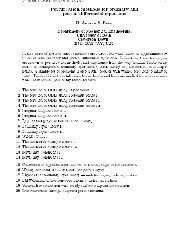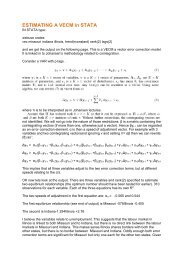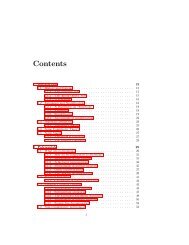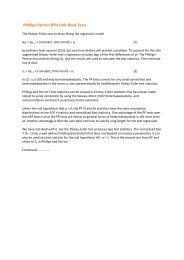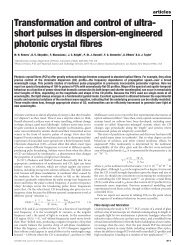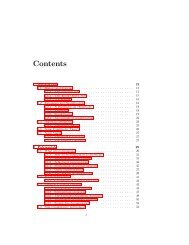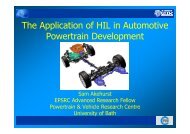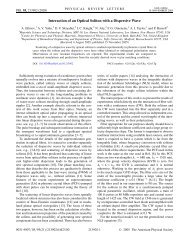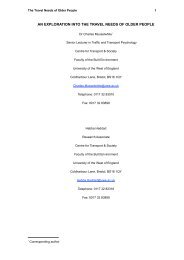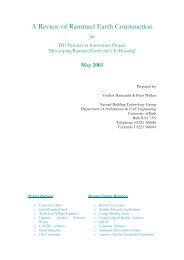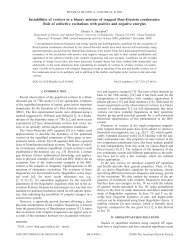[Luyben] Process Mod.. - Student subdomain for University of Bath
[Luyben] Process Mod.. - Student subdomain for University of Bath
[Luyben] Process Mod.. - Student subdomain for University of Bath
You also want an ePaper? Increase the reach of your titles
YUMPU automatically turns print PDFs into web optimized ePapers that Google loves.
8 PROCESS MODELING, SIMULATION, AND CONTROL FOR CHEMICAL ENGINEERS<br />
from my successes, but probably more from my failures. I hope this book helps<br />
you to have many <strong>of</strong> the <strong>for</strong>mer and not too many <strong>of</strong> the latter. Remember the<br />
old saying: “If you are making mistakes, but they are new ones, you are getting<br />
smarter.”<br />
1.4 MOTIVATION FOR STUDYING<br />
PROCESS CONTROL<br />
Some <strong>of</strong> the motivational reasons <strong>for</strong> studying the subjects presented in this book<br />
are that they are <strong>of</strong> considerable practical importance, they are challenging, and<br />
they are fun.<br />
1. Importance. The control room is the major interface with the plant. Automation<br />
is increasingly common in all degrees <strong>of</strong> sophistication, from single-loop<br />
systems to computer-control systems.<br />
2. Challenging. You will have to draw on your knowledge <strong>of</strong> all areas <strong>of</strong> chemical<br />
engineering. You will use most <strong>of</strong> the mathematical tools available (differential<br />
equations, Laplace trans<strong>for</strong>ms, complex variables, numerical analysis, etc.) to<br />
solve real problems.<br />
3. Fun. I have found, and I hope you will too, that process dynamics is fun. You<br />
will get the opportunity to use some simple as well as some fairly advanced<br />
mathematics to solve real plant problems. There is nothing quite like the thrill<br />
<strong>of</strong> working out a controller design on paper and then seeing it actually work<br />
on the plant. You will get a lot <strong>of</strong> satisfaction out <strong>of</strong> going into a plant that is<br />
having major control problems, diagnosing what is causing the problem and<br />
getting the whole plant lined out on specification. Sometimes the problem is in<br />
the process, in basic design, or in equipment malfunctioning. But sometimes it<br />
is in the control system, in basic strategy, or in hardware malfunctioning. Just<br />
your knowledge <strong>of</strong> what a given control device should do can be invaluable.<br />
1.5 GENERAL CONCEPTS<br />
I have tried to present in this book a logical development. We will begin with<br />
fundamentals and simple concepts and extend them as far as they can be gainfully<br />
extended. First we will learn to derive mathematical models <strong>of</strong> chemical<br />
engineering systems. Then we will study some <strong>of</strong> the ways to solve the resulting<br />
equations, usually ordinary differential equations and nonlinear algebraic equations.<br />
Next we will explore their openloop (uncontrolled) dynamic behavior.<br />
Finally we will learn to design controllers that will, if we are smart enough, make<br />
the plant run automatically the way we want it to run: efficiently and safely.<br />
Be<strong>for</strong>e we go into details in the subsequent chapters, it may be worthwhile<br />
at this point to define some very broad and general concepts and some <strong>of</strong> the<br />
terminology used in dynamics and control.


![[Luyben] Process Mod.. - Student subdomain for University of Bath](https://img.yumpu.com/26471077/29/500x640/luyben-process-mod-student-subdomain-for-university-of-bath.jpg)
